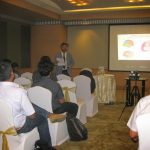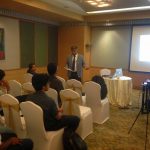- July 14, 2014
- Posted by: kunalsabnis
- Category:BLOG, Chennai, Events, Speaker Events
Contributed by: Meera Siva
Chennai chapter of the IAIP conducted an event on 8th July 2014 to learn about stress and how the brain’s capability can be improved. The event featured NS Srinivasan, Founder of Medha Mind Enhancements, which utilizes neuro-biological feedback to improve brain function. The speaker was trained under pioneers in this field such as Dr Barry Sterman in the US and has garnered knowledge in various ashrams in India for nearly 15 years. He has been a personal coach for sports personalities such as Kris Srikanth and Rahul Dravid, worked with the Indian Military Academy and has published a book titled “Brain Re-engineering” (Sage, 2003).
The brain is a very powerful ‘machine’ and knowing what is ‘under the hood’ will help us understand our actions and reasons for reduced performance. While many therapies may be popular to take care of a single issue, knowing the root cause, through quantitative measurements rather than qualitative assessments, will help produce lasting results.
Various parts of the brain handle different functions such as sensory input (sight, sound, touch) collection, putting the data into context and acting on it. These parts are connected by neural networks through which electrical signals are transmitted. Using EEG data on 19 sites in the brain, the strength of connection and the response time for messages can be accurately measured to find where the issues may be, before corrective suggestions are made.
Of the various parts in the brain, the pre-frontal lobe is very important. This handles a large number of activities such as learning from the past, reality testing, shifting strategy, pruning input stimulus, to name a few. If this is not functioning well or if inputs to this part are not reaching or inputs reach with mis-aligned timing, one can miss out critical information and take bad decisions. All these issues can be assessed and corrected.
If inputs are incomplete or we only provide assumptions (such as when we worry about future about which no real input exists), then a lot of brain energy is wasted in solving ‘complex’ problems for which there may be no answers. This waste of resource leads us to miss the here-and-now and we are left with a new set of issues to solve. So staying focused on the goal and being disciplined about working with data, rather than likes and dislikes (emotions) will lower stress.
To reduce stress, one must assess if the profession is leading them to calmness or not, particularly after one is 40+ years old. When you take up the role of investment manager or analyst, it must be played perfectly, without ambiguity on why you are doing it (what is the goal). If one is calm, one can pick up small pieces of critical information, which is missed by many, thereby leading you to great insights and gains.



